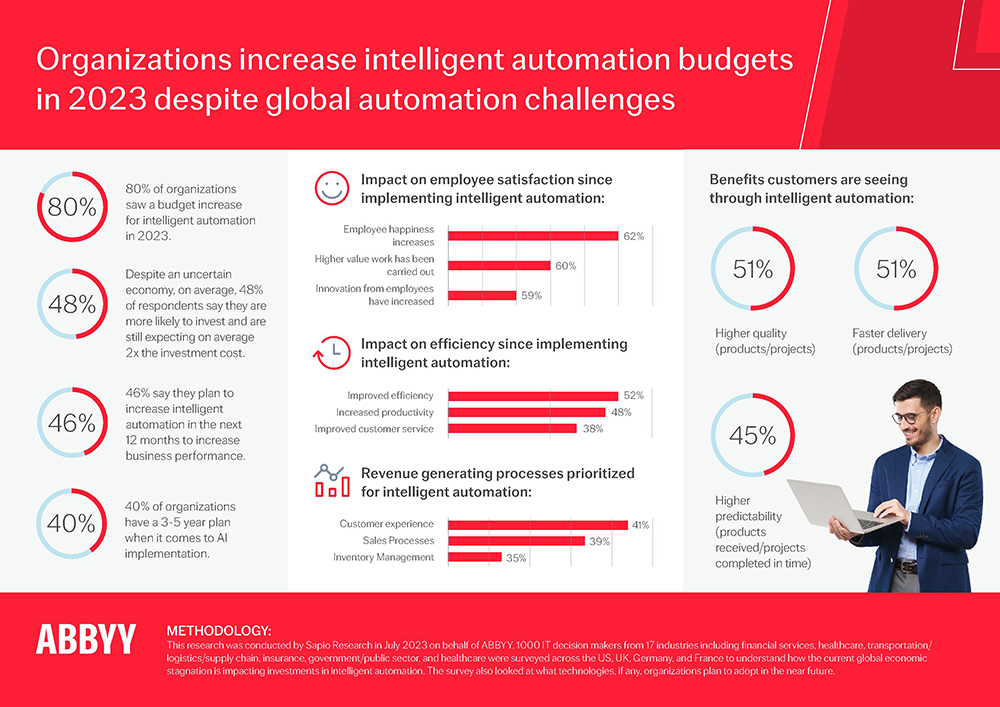New ABBYY Report: 80% Have Increased Intelligent Automation Budgets in Past Year
by Gabrielle Lukianchuk, Chief Marketing Officer
Considering the results that we see our customers realizing with intelligent automation, like saving hundreds of hours per month in manual data entry or reducing outsourcing labor costs by 25 percent, it's no surprise that 89 percent of companies we surveyed said that they have already implemented an AI strategy today.
It’s precise, it’s fast, and it’s getting the job done. Artificial intelligence (AI) is creating more and more space for itself in our daily work activities. This was recently demonstrated by our newly published global study of IT decision makers in various industries across the US, UK, Germany, and France. According to the survey responses, more than 80 percent of companies have increased their investments in artificial intelligence this year. Which begs the question: are employee concerns of mass layoffs warranted?

The global economy continues to pose new challenges for enterprises and has a corresponding effect on their willingness to invest. However, technological innovations in intelligent automation (IA), particularly in the area of AI, are making their way as a priority. And there are good reasons for this: 60 percent of our survey respondents stated that intelligent automation has relieved employees of many routine tasks so they can devote more time to customer and sales-oriented activities, supporting enterprise growth-focused needs. Respondents also reported that employee satisfaction has increased with intelligent automation (62 percent), and innovation by employees is more encouraged (59 percent).
As enterprise teams are finding that AI delivers more measured advantages than threats, more than half of our respondents have noticed greater process efficiency with their use.
Also, employee productivity has increased (48 percent), and work-life balance has improved for many due to the incorporation of intelligent automation in the workplace. In terms of AI reducing work stress—another trending topic—the US reported the highest level of effectiveness (41 percent), closely followed by the UK, Germany, and France.
These are all important factors that impact employee loyalty, retention, productivity, and growth in the enterprise…and furthermore, an important aspect in times when phenomena such as "quiet quitting" after challenging pandemic years demonstrate that satisfaction and appreciation at work are becoming increasingly important for the enterprise’s future growth and team success.
Establishing artificial intelligence as a team player in the enterprise
Experts underline the importance of making AI a team player. With the awareness that AI systems cannot replace human intelligence and that information generated by them still needs to be reviewed, AI and other intelligent automation technologies can help enormously with executing specific tasks…and with remarkable time savings. More than half of all executives surveyed confirmed a higher quality of products and projects as well as faster delivery of products to customers since the use of AI. Likewise, over a third reported that customer service has improved with it as well.
The potential of AI to be a real game changer with near-term benefits is being revealed. Even during the industrial revolution, people worried about the negative impact of machines in business, but the opposite proved to be the case. I believe that we can establish new technologies like AI to be used in such a way that they make our working lives better and easier—as a real team player would—and not become an obstacle or a disruptive factor. Just as digital tools are used in health and fitness today to measure progress and success (miles run, heart rate, nutritional values, etc.), new technologies can also be used in companies to provide vital metrics on how the business is running. With the help of AI-based technologies for monitoring processes, data can also be collected on how customers interact with the corporate brand via different channels, for example. Thanks to this monitoring, forecasts can be made about what can be improved, what impact these improvements will have on the processes, and what results can be achieved.
Considering the results that we see our customers realizing with intelligent automation, like saving hundreds of hours per month in manual data entry or reducing outsourcing labor costs by 25 percent, it's no surprise that 89 percent of companies we surveyed said that they have already implemented an AI strategy today. Nearly half said they have achieved double the ROI by using AI in their intelligent automation initiatives, improving complex processes and accelerating the use of data. And over 80 percent have increased their investment in AI by up to 35 percent.
This survey underscores that IT leaders in the enterprise are realizing meaningful outcomes from their AI and IA investments. Questions concerning the impact of current rapid developments in new technologies are still valid, and critical examination is absolutely essential. The enterprise must consider the entire end-to-end execution of their business operations when determining where and how intelligent automation including AI can be the team player they need.
You can download the full ABBYY State of Intelligent Automation Report here.
















